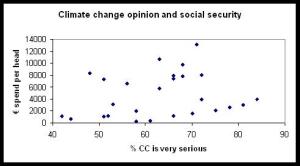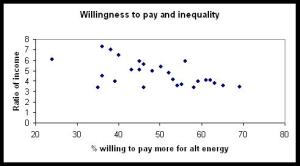
Would more security and more equality help improve climate politics? One recent analysis that has attracted a lot of attention – The Spirit Level by Richard Wilkinson and Kate Pickett - argues that more inequality leads to greater consumerism and individualism, which in turn is a block on co-operation to tackle climate change. Meanwhile, Ted Nordhaus and Michael Shellenberger argued in their book Break Through that a precondition for a concern with environmental sustainability is genuine economic security.
Is there evidence to support these ideas? As a first cut, we looked at Eurobarometer and Eurostat data on the EU 27 countries about attitudes to climate change (% saying it is a very serious issue), willingness to pay more for alternative energy, a measure of inequality (ratio of income in top two deciles to income in bottom two deciles) and a measure of economic security (spend per head on social protection).
It turns out that the relationship between inequality and security on the one hand and attitudes to climate change on the other are not strong. As the first two following figures show, there appears to be no relationship between the percentage saying climate is a very serious issue and the inequality measure, and only a loose one with the security indicator.


However, the picture with the percentage willing to pay more for alternative energy is very different. This measure is quite strongly related to inequality – the more unequal the income distribution, the smaller the proportion willing to pay more.

Similarly, the greater the spend on social protection, the higher the willingness to pay more for alternative energy.


One thing these data suggest are that the usual opinion polls asking people how they feel about climate change are not a good test of how they feel about real policies.
Of course, correlation and causation are not the same thing, and one can easily tell a story here about underlying sets of values that determine both variables (which in a way, is the point). Nevertheless, interesting and suggestive stuff…
No comments:
Post a Comment